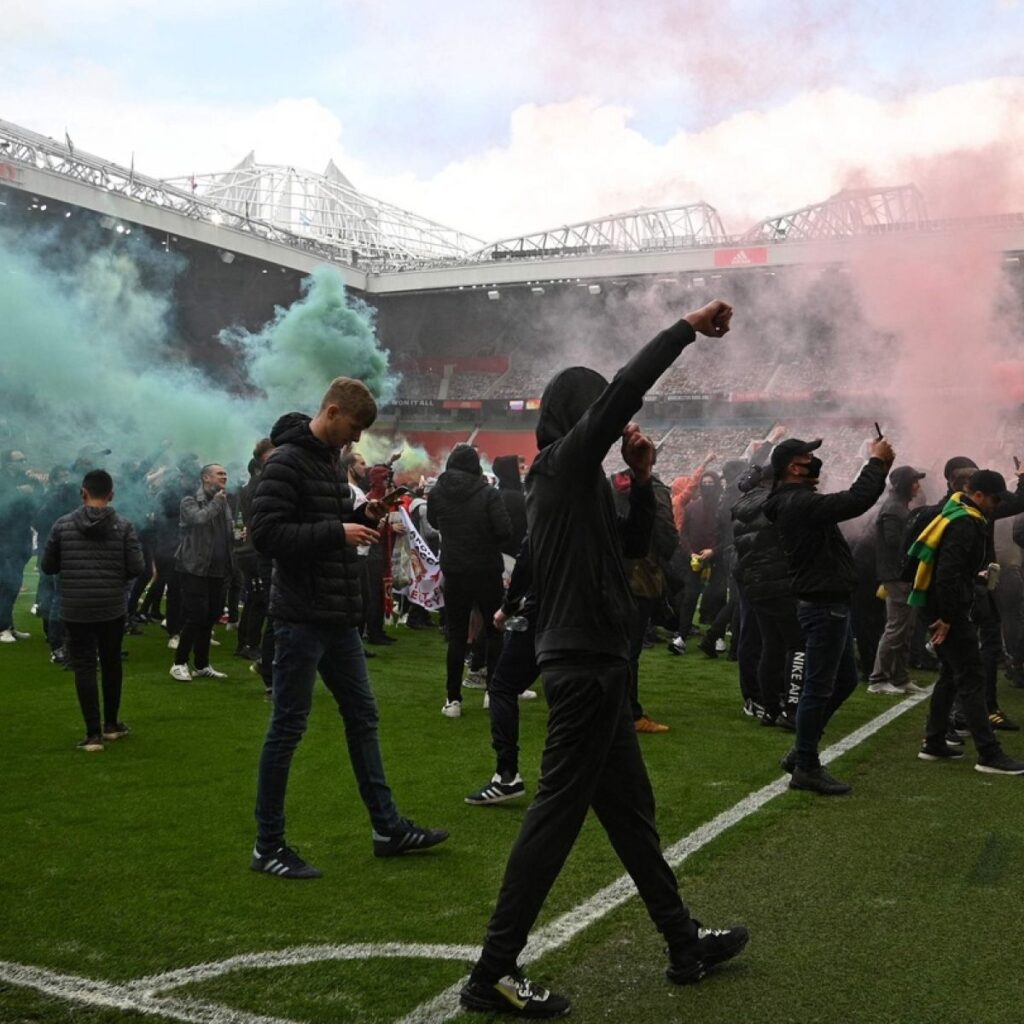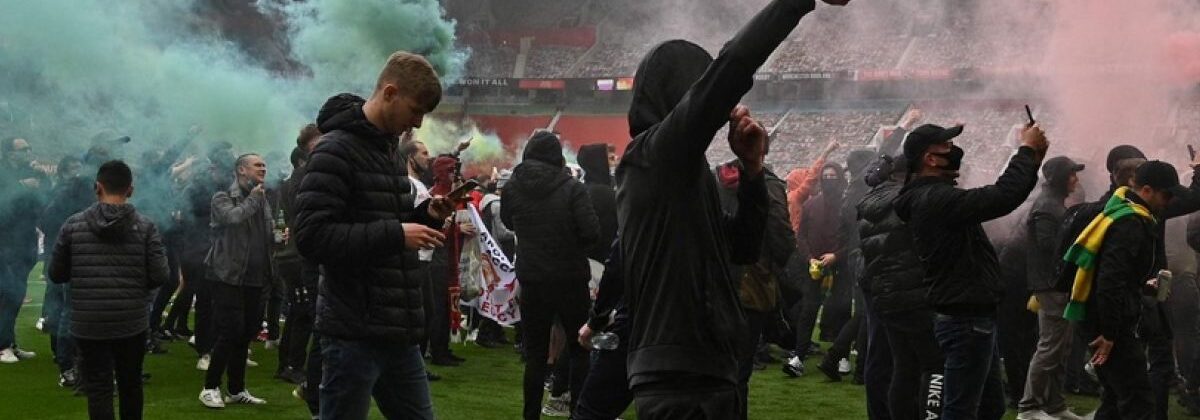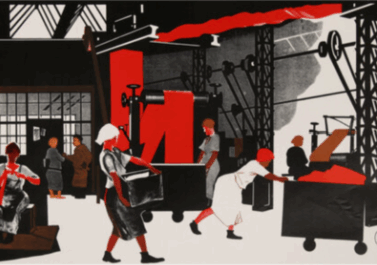
“The people’s game” – run by and for billionaires
2nd May 2021 saw the first ever protest induced postponement of a Premier League football match in history. The scheduled Manchester United home fixture against Liverpool was abandoned after Manchester fans broke into the ground and occupied the pitch. Fans lit fireworks and flares and held banners and placards calling for the club owners (Billionaire businessmen Glazer brothers) to “fuck off.” Fans showed a large amount of commitment and dedication to entering the stadium. Police reported (to the extent that we can believe them) that six officers were injured in the protests, with one sustaining a fractured eye socket.
The cause of the protests was anger against club owners and (their now aborted) proposals for a new European Super League (ESL). The league’s announcement at 11pm on 18 April, to accommodate US audiences, was accompanied by rising share prices and jubilant advertisers. ESL operations were suspended three days after its founding due to a furious backlash from national football governing bodies, pundits, players and fans. Some fans are continuing the protests in an effort to get their clubs under new ownership. The Old Trafford pitch invasion was part of that effort. It may well have contributed to the decision by UK retail and technology company The Hut Group [1] to pull out of a £200 million sponsorship deal with the club. Which, given what follows, may not be such a bad thing. It depends on what you want. It has been interesting to watch football legends turned pundits debate societal values and capitalism in their pre-match discussions.
The whole affair has foregrounded debates about the state of our economic system and the trajectory of our society in general, more than most issues today. The backlash from fans, players and pundits was intense. Many football followers felt that the 12 clubs that had signed up to ESL had overstepped the mark. The new structure would have not been in line with an understanding that success or failure and particularly promotion and relegation has to be linked to any club’s results in that season. The ESL proposal broke that framework and was seen to be a self-serving enterprise by the clubs and/or their owners. That view also overlapped for many with a view that the owners were over greedy, leeching off the game. It’s not hard to understand that reaction given that the English signatories included clubs such as Chelsea, owned by the oligarch Roman Abramovich (estimated wealth in 2019, US$12.9 Billion), and Manchester City, owned by Sheikh Mansour (estimated wealth, US$22 Billion), member of the Abu Dhabi royal family and Deputy Prime Minister of the United Arab Emirates. Many observers have gone on to point out that, what the ESL proposed was, in fact, only a more extreme version of a revised format for the Champions League from 2024 onwards announced by UEFA (the European Federation) on April 21st.
From an even wider perspective, the proposed ESL was, in many ways, another example of what has been happening in advanced economies for decades – the offshoring of production. While ticket sales, merchandise and TV subscriptions still contribute a significant amount of income for clubs, the real money comes from advertising. When an industry is dominated by an advertising revenue model, the product is not this or that widget, but the eyes watching the screen. The products are the fans watching the match, the consumers are advertisers. The greater the number of eyes on the match, the more you can demand for your advertising space. The business model means that for the billionaire elite, the spectators actually in the stadiums are only the “icing on the cake.” Sky high prices for the top teams make it impossible for many working class people to attend regularly, if at all. The corporate drive to turn top flight soccer into a media based product, was further strengthened during the Covid restrictions, which forced even more fans to watch the action from the comfort of their sofas. Advertisers also want the viewers with the fattest wallets watching. No point advertising your high-end products or your gambling website to people with no money! This is partly the rationale behind the ever-increasing season ticket prices and the disgusting amount of atmosphere-destroying corporate boxes, full of hob-knobbing company boot-lickers, separated from the hoi polloi and not even watching the match. Corporations, and the wealthy elite that run them, don’t want informed, secure and empowered members of a community. They want ill-informed, insecure, impotent and isolated individuals – so they’re easier to rip off. Advertisers see the pitch as a distraction from the billboards and the match is the interlude before the important bit: the adverts. The fans’ love and sense of connection to the clubs (that are now transnational corporations) is the unpaid labour that fuels this industry. Under this model football’s historic ties to working class communities are being shattered.
The orchestrators of the ESL were attempting to expand the scale of this market to other continents and increase their share of the existing revenue stream by setting themselves up as an elite league. The terrible job the would-be ESL owners made in pitching the proposals exposes their level of detachment. It’s pretty clear they have no idea what the fans of their clubs are thinking – and don’t care. The ESL plan also led to a hostile reaction from the other big business interests – the real decision makers. The national governing bodies were obviously incensed and made various threats. There is a plausible theory that the ESL clubs were merely making a power play in an attempt to get a better deal from their respective governing bodies, UEFA and FIFA. Whatever the case may be, fans are now looking for solutions and contemplating actions. Many fans are wondering whether fan ownership is the answer. The refusal of the German clubs, that traditionally have far more fan ownership than in the UK, to participate in the ESL seems to support this view. In England, only two or three clubs in the Football League are run that way although there are several dozen in the tiers below that. In contrast the model exists among top flight clubs elsewhere including Athletic Bilbao, Bayern Munich and some of the leading Brazilian clubs including São Paulo, Santos, Flamengo and Palmeiras. [2] Other fans, like those at Arsenal, drawn in by promises of “fan representation,”are pinning their hopes on a supposedly more benevolent billionaire, Spotify owner Daniel Ek and a consortium of team legends to save their club. Fans have been discussing how they might link up with other fans across borders to press their interests. Reports of Barcelona fans kicking off were welcomed and debated. Some form of fan ownership may be a step in the right direction, but if fans really want to revive the feeling of attachment and local community that they expect from their involvement, questioning the capitalist’s system that drags their beloved game and everything else of value into the gutter, is essential.
If football remains beholden to advertisers, fan-owned clubs will be subject to the same pressures and imperatives as big money owned clubs and degenerate just as surely. Although the fan ownership model means that no private capital owns the club, it leaves the clubs entirely enmeshed in all the money related structures that control the game. The supporters’ trusts or committees, have to shape the clubs’ activities to fully comply with the dictates of all those structures. Ultimately, they have to run the club on the basis of profit or loss rather than the interests of supporters or any other participants. The profit motive is noxious and corrupting.To shore up their own position the Premier League in England has introduced an Owners’ Charter which would prevent football club owners from forming future breakaway leagues. Such cosmetics will do nothing about the situation where clubs such as Notts County, Leyton Orient and Bury have been ruined, as ownership has passed to any criminal, oligarch, tax avoider or crank to buy, fleece and ruin them. In the case of Bury, the total lack of concern by the big money organisations was amply shown when the billionaire owners of the two Manchester ESL would-be members, refused to provide “loose change” to bail out a long standing local club.The blatant hypocrisy of the government allowing 2500 UEFA and FIFA officials, politicians and tournament sponsors, to flout Covid quarantine rules, in an effort to guarantee the EURO21 finals are held at Wembley, is another recent example of “money talking” in football. [3] Of course the domination of soccer by the interests of “capital” (the bosses’ system of owning and controlling) doesn’t exist just in England or Europe. The World Cup scheduled to take place in Qatar at the end of 2022 will take place in seven new, purpose-built stadiums. An investigation by the Guardian paper earlier this year showed the appalling reality that up to that point the project had resulted in the deaths of more than 6,500 migrant workers from the Indian sub-continent. [4]
What can we make of all of the above? It depends on what you want. In ages passed, powerful elites saw the coming together of working people to energetically chase a ball around, as a cause for concern and even outlawed such unruly behaviour. Their concerns were not wholly unjustified as the large gatherings were not only often rough affairs, that resulted in smashed windows, but were sometimes used by the commoners in attendance to push for a political objective. (The pulling down of some rich dudes mill, the burning of enclosure fences, stopping the draining of fens etc.) [5] The gutsy and thoughtful action in protest against the ESL, which hit the wealthy owners where it hurts, was in keeping with the ancient spirit of rebellion which used to accompany the kicking of a leather ball around town. The fans success in gaining entry to the stadium and disrupting business as usual was great to see, especially in the shadow of the stifling isolation of the lockdowns we’ve endured. The cancellation of a sanitised corporate controlled football match, caused by the pitch invasion at Old Trafford, could be seen as the most “football” the Premier League’s seen for quite some time. It also offers an example of the ways that fans working together, perhaps globally, could challenge the current model. When it comes to football, it is amazing and frustrating in equal measure, to see fellow workers speaking with such erudition and acting with such conviction. We have incredible knowledge about the ins and outs of the entire process and have complete confidence that we are capable of doing just as good a job as those at the top. “I can play better than that idiot,” “the manager’s dog shit, he should use these tactics.” We make these assertions even though they are almost never true for premier league clubs (most top flight players and managers didn’t get to where they are by being crap at what they do) and even though we have almost no influence over the course of events. Why don’t we think like this when it comes to something we genuinely do know about and have influence over? – Our work!! If we spent half the time we spend on pondering a tactical decision at a match we can’t influence, in talking to other fellow workers about the way we want our daily lives to be run, we would be well on our way to solving a great many problems in our society!
[2]90min.com/posts/the-biggest-fan-owned-football-clubs-in-the-world
[3]https://www.mirror.co.uk/news/uk-news/covid-19-rules-ended-were-24405867
[5] http://www.doordie.org.uk/issues/issue-9/95-it-s-all-kicking-off.html



